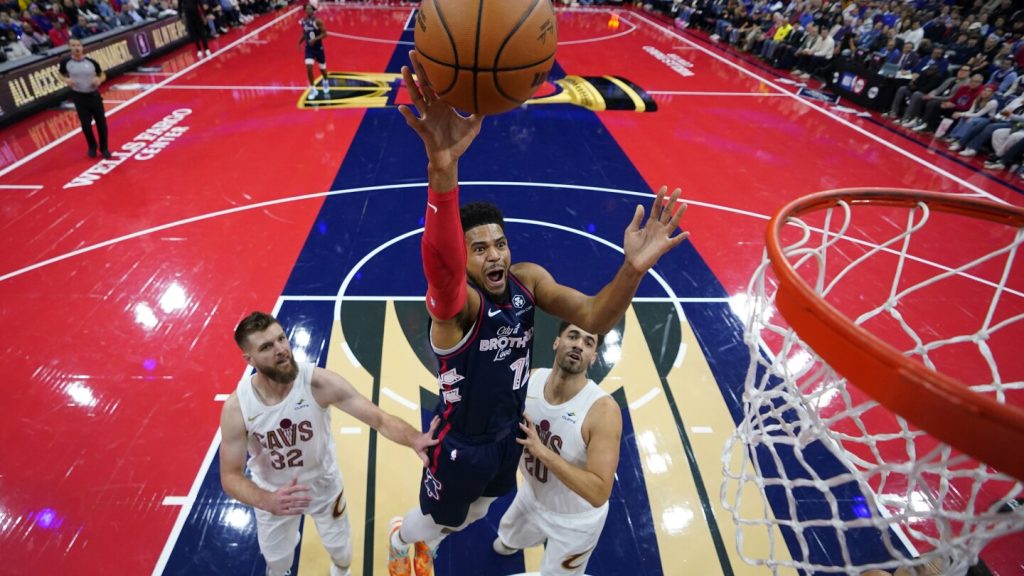The NBA has agreed to terms on a new media deal, a record 11-year, $76 billion pact that will ensure player salaries will continue to rise for the foreseeable future and will certainly change how some viewers access the game for years to come.
A person familiar with the negotiations told The Associated Press that the networks have already received the term sheet and the next step is for the league’s board of governors to approve the deal.
The person spoke to The Associated Press on condition of anonymity Wednesday because he could not discuss such pressing issues.
The board is scheduled to meet in Las Vegas next week to coincide with the NBA Summer League, and a deal would likely be signed around that time, subject to passing through various committees and other approvals.
The NBA had no comment Wednesday.
The deal, which set an NBA record for both length and total value, goes into effect in the 2025-26 season. Games will continue to air on ESPN and ABC, with select games on NBC and Amazon Prime in the future. TNT Sports, part of the NBA broadcast family since the 1980s, may be leaving but still has five more days to match one of the deals.
The five-day countdown will begin once the league sends the completed contract to TNT.
The deal was first reported by The Athletic.
ESPN and ABC will continue to broadcast the league’s best package, which includes the NBA Finals and one of the conference finals series. ABC has aired the NBA Finals since 2003. ABC will continue to broadcast games on Saturday nights and Sunday afternoons, when the NFL regular season ends.
ESPN’s main night will still be Wednesday, with some games scheduled to air on Friday and Sunday.
Exclusive broadcast of the Finals comes with a big price hike: The Walt Disney Co., which owns ESPN and ABC, will pay $2.6 billion a year under the new deal, compared with $1.4 billion a year under the current contract.
The return of NBC, which aired NBA games from 1990 to 2002, will mean the NBA will have two broadcast network partners for the first time.
NBC, expected to make $2.5 billion per season, will air games on Sunday nights after the NFL season ends, and every Tuesday during the regular season, with Monday night games available exclusively on Peacock.
Prime Video will air the game on Thursday nights after NFL games, with the other nights being Friday and Saturday.
NBC and Prime Video will alternate broadcasting the other conference finals, with Prime Video averaging $1.8 billion per year in rights fees.
TNT Sports will pay $1.4 billion per season, and given the value of the three proposed packages, it’s likely the company would be willing to match that for Prime Video rights.
Silver said during last month’s NBA Finals that the length of the contract — he didn’t specify whether it was an 11-year deal — “is good for the stability of the league.”
“But to some extent that means you’re trying to predict the future, which of course you can’t do,” Silver said in June. “So part of it is a bet on the partners that we end up working with and their ability to adapt to the times, their willingness to continue to invest in media and to go global, which, as I pointed out earlier, is also very important to the league.”
In the short term, the deal almost certainly means that the league’s salary cap will rise 10% each year, a limit allowed by provisions of the latest collective bargaining agreement between the NBA and its players. That means players like Oklahoma City’s Shai Gilgeous-Alexander and Dallas’ Luka Doncic could make around $80 million in 2030-31, and there’s at least some chance that top players could be making closer to $100 million a season by the mid-2030s.
This would also pave the way for the NBA’s next major agenda: expansion.
Silver has been very clear about the order of priorities in recent seasons: maintain labor peace (which was achieved with a new collective bargaining agreement), reach a new media contract (now essentially complete), and only then will the league look to add new franchises. Las Vegas and Seattle are typically among the cities most often mentioned as expansion candidates, with other groups such as Montreal, Vancouver and Kansas City also expected to show interest.
As the total value of broadcast rights packages has increased over the past 25 years, so have salaries, depending on how much that revenue stream ultimately contributes to the salary cap.
When NBC and Turner agreed to a four-year, $2.6 billion deal beginning with the 1998-99 season, the salary cap was $30 million per team and the average salary was about $2.5 million. This season, the average salary is more than $10 million per player and will continue to rise.
When the NBC-Turner deal that began a quarter century ago expired, the next six seasons of the deal cost ABC, ESPN and Turner about $4.6 billion. The next deal, for seven years, will cost the networks $7.4 billion.
The current contract, which expires next season, shatters those records at about $24 billion over nine years.
And now it seems like pocket change.
___
AP NBA: https://apnews.com/hub/NBA


